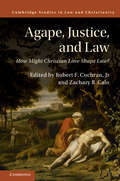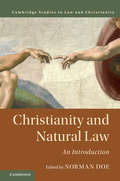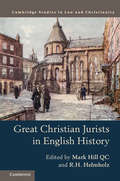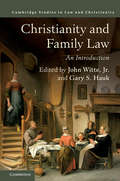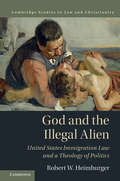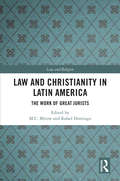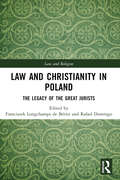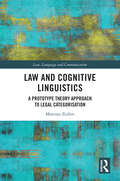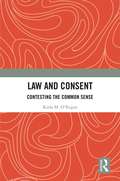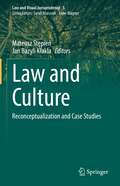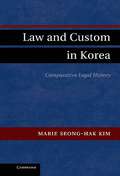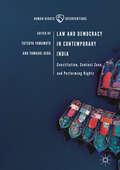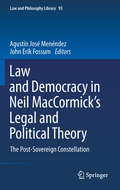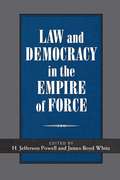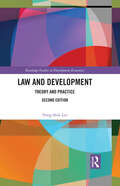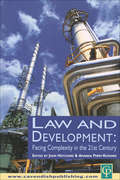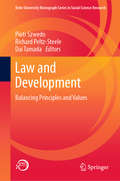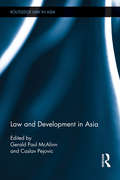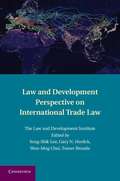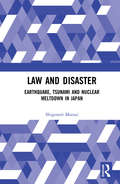- Table View
- List View
Law and Christianity: Pope Benedict XVI’s Legal Thought
by Cartabia, Marta and Simoncini, Andrea Marta Cartabia Andrea SimonciniThroughout Pope Emeritus Benedict XVI's pontificate he spoke to a range of political, civil, academic, and other cultural authorities. These speeches reveal a striking sensitivity to the fundamental problems of law, justice, and democracy. He often presented a call for Christians to address issues of public ethics such as life, death, and family from what they have in common with other fellow citizens: reason. This book discusses the speeches in which the Pope Emeritus reflected most explicitly on this issue, along with commentary from distinguished legal scholars. It responds to Benedict's invitation to engage in public discussion on the limits of positivist reason in the domain of law from his address to the Bundestag. Although the topics of each address vary, they are joined by a series of core ideas whereby Benedict sketches, unpacks, and develops an organic and coherent way to formulate a 'public teaching' on justice and law.
Law and Christianity: How Might Christian Love Shape Law? (Law and Christianity)
by Cochran Robert F. Jr. Calo Zachary R.In a provocative essay, philosopher Jeffrie Murphy asks: 'what would law be like if we organized it around the value of Christian love, and if we thought about and criticized law in terms of that value?'. This book brings together leading scholars from a variety of disciplines to address that question. Scholars have given surprisingly little attention to assessing how the central Christian ethical category of love - agape - might impact the way we understand law. This book aims to fill that gap by investigating the relationship between agape and law in Scripture, theology, and jurisprudence, as well as applying these insights to contemporary debates in criminal law, tort law, elder law, immigration law, corporate law, intellectual property, and international relations. At a time when the discourse between Christian and other world views is more likely to be filled with hate than love, the implications of agape for law are crucial.
Law and Christianity: An Introduction (Law and Christianity)
by Norman DoeHistorically, natural law has played a pivotal role in Christian approaches to the law, and a contested role in legal philosophy generally. However, comparative study of natural law across global Christian traditions is largely neglected. This book provides not only the history of natural law ideas across mainstream Christian traditions worldwide, but also an ecumenical comparison of the contemporary natural law positions of different traditions. Its focus is not solely theoretical: it tests the practical utility of natural law by exploring its use in the legal systems of the churches studied. Alongside analysis of the assumptions underlying the concept, it also proposes a jurisprudence of Christian law itself. With chapters written by distinguished lawyers and theologians across the world, this book is designed for those studying and teaching law or theology, those who practice and study ecumenism, and those involved in the practice of church law.
Law and Christianity: Great Christian Jurists in English History (Law and Christianity)
by Mark Hill Helmholz R. h.The Great Christian Jurists series comprises a library of national volumes of detailed biographies of leading jurists, judges and practitioners, assessing the impact of their Christian faith on the professional output of the individuals studied. Little has previously been written about the faith of the great judges who framed and developed the English common law over centuries, but this unique volume explores how their beliefs were reflected in their judicial functions. This comparative study, embracing ten centuries of English law, draws some remarkable conclusions as to how Christianity shaped the views of lawyers and judges. Adopting a long historical perspective, this volume also explores the lives of judges whose practice in or conception of law helped to shape the Church, its law or the articulation of its doctrine.
Law and Christianity: An Introduction (Law and Christianity)
by Gary S. Witte John Jr. HaukThe Western tradition has always cherished the family as an essential foundation of a just and orderly society, and thus accorded it special legal and religious protection. Christianity embraced this teaching from the start, and many of the basics of Western family law were shaped by the Christian theologies of nature, sacrament, and covenant. This volume introduces readers to the enduring and evolving Christian norms and teachings on betrothals and weddings; marriage and divorce; women's and children's rights; marital property and inheritance; and human sexuality and intimate relationships. The chapters are authoritatively written but accessible to college and graduate students and scholars, as well as clergy and laity. While alert to the hot button issues of sexual liberty today, the contributing authors let the historical figures speak for themselves about what Christianity has and can contribute to the protection and guidance of our most intimate association.
Law and Christianity: United States Immigration Law and a Theology of Politics (Law and Christianity)
by Robert W. HeimburgerToday in the United States, millions of men, women, and children are considered 'illegal aliens' under federal law. While the presence of these migrants runs against the law, many arrive in response to U. S. demand for cheap labor and stay to contribute to community life. This book asks where migrants stand within God's world and how authorities can govern immigration with Christian ethics. The author tracks the emergence of the concept of the illegal alien in federal U. S. law while exploring Christian ways of understanding belonging, government, and relationships with neighbors. This is a thought-provoking book that provides a fresh response to the difficult issue of illegal immigration in the United States through the context of Christian theology.
Law and Christianity in Latin America: The Work of Great Jurists (Law and Religion)
by M.C. Mirow and Rafael DomingoThis volume examines the lives of more than thirty-five key personalities in Latin American law with a focus on how their Christian faith was a factor in molding the evolution of law in their countries and the region. The book is a significant contribution to our ability to understand the work and perspectives of jurists and their effect on legal development in Latin America. The individuals selected for study exhibit wide-ranging areas of expertise from private law and codification, through national public law and constitutional law, to international developments that left their mark on the region and the world. The chapters discuss the jurists within their historical, intellectual, and political context. The editors selected jurists after extensive consultation with legal historians in various countries of the region looking at the jurist’s particular merits, contributions to law in general, religious perspective, and importance within the specific country and period under consideration. Giving the work a diversity of international and methodological perspectives, the chapters have been written by distinguished legal scholars and historians from Latin America and around the world. The collection will appeal to scholars, lawyers, and students interested in the interplay between law and religion. Political, social, legal, and religious historians among other readers will find, for the first time in English, authoritative treatments of the region’s essential legal thinkers and authors. Students and other who may not read Spanish will appreciate these clear, accessible, and engaging English studies of the region’s great jurists.
Law and Christianity in Poland: The Legacy of the Great Jurists (Law and Religion)
by Franciszek Longchamps de Bérier Rafael DomingoThis volume is the first comprehensive study of the Polish history of law and Christianity written in English for a global audience. It examines the lives of twenty-one central figures in Polish law with a focus on how their Christian faith was a factor in molding the evolution of law in their country and the region. The individuals selected for study exhibit wide-ranging areas of expertise, from private law and codification, through national public law and constitutional law, to international developments that left their mark on Poland and the world. The chapters discuss the jurists within their historical, intellectual, and political context. The editors selected jurists after extensive consultation with legal historians looking at the jurists’ particular merits, contributions to law in general, religious perspective, and period under consideration. The collection will appeal to scholars, lawyers, and students interested in the interplay between law and religion. Political, social, legal, and religious historians, among other readers, will find, for the first time in English, authoritative treatments of essential Polish legal thinkers and authors.
Law and Cognitive Linguistics: A Prototype Theory Approach to Legal Categorisation (ISSN)
by Mateusz ZeifertThis book advances the prototype theory of categorisation within a legal context. The work adopts a multidisciplinary approach and draws on insights from cognitive psychology, cognitive linguistics, and analytic philosophy to discuss semantic problems present in law. Designed as a bridge between cognitive linguistics and legal theory, it argues that categorisation is a crucial cognitive operation for the application of law and that theories of categorisation are relevant to legal theory. It makes the case that the prototype approach is better suited than more formal approaches usually utilised in jurisprudence to explaining many familiar linguistic problems found in law, such as vagueness, polysemy, the flexibility of meaning, the generality of language, context dependence of meaning, linguistic indeterminacy, and so on. The book focuses on problems of semantic analysis in law, both in concrete cases, that is, particular cases before courts, and, at the theoretical level, on methods of statutory interpretation. It will be a valuable resource for academics and researchers working in the areas of Law and Language, Legal Theory, Legal Philosophy, and Legal Linguistics.
Law and Consent: Contesting the Common Sense
by Karla M. O'ReganConsent is used in many different social and legal contexts with the pervasive understanding that it is, and has always been, about autonomy – but has it? Beginning with an overview of consent’s role in law today, this book investigates the doctrine’s inseparable association with personal autonomy and its effect in producing both idealised and demonised forms of personhood and agency. This prompts a search for alternative understandings of consent. Through an exploration of sexual offences in Antiquity, medical practice in the Middle Ages, and the regulation of bodily harm on the present-day sports field, this book demonstrates that, in contrast to its common sense story of autonomy, consent more often operates as an act of submission than as a form of personal freedom or agency. The book explores the implications of this counter-narrative for the law’s contemporary uses of consent, arguing that the kind of freedom consent is meant to enact might be foreclosed by the very frame in which we think about autonomy itself. This book will be of interest to scholars of many aspects of law, history, and feminism as well as students of criminal law, bioethics, and political theory.
The Law and Consumer Credit Information in the European Community: The Regulation of Credit Information Systems
by Federico FerrettiConsumer credit information systems are the tools used by the majority of lenders to manage credit risk, with lenders accessing credit reference databases managed by third party providers to evaluate a consumer‘s credit application. So far, the subject of consumer credit reporting has been left to the predominant attention of the economic and busin
Law and Creativity in the Age of the Entertainment Franchise
by Kathy Bowrey Michael HandlerMuch of the real value in the entertainment industry today lies in franchises – fictional universes, entertainment concepts, reinventions of cultural traditions and celebrity – that create an ongoing presence in the marketplace. The entertainment franchise now shapes the global cultural landscape. However, scholars have devoted little attention to how intellectual property law has changed or is being stretched in practice to accommodate this type of creativity and form of enterprise. Covering law and practice in jurisdictions such as the UK, the EU, the USA, Australia, Spain and the Caribbean, this collection explores the 'fit' of intellectual property laws with specific franchises and tracks the way creators and entrepreneurs work around law's limitations. Case studies include mega-film franchises, fan activity, hip-hop, the management of celebrity reputation, flamenco, 'Disneyfied' theatre, film and television funding, arts festivals and 'carnival in a box'.
Law and Crime (Key Approaches to Criminology)
by Gerry Johnstone Tony WardWhat is the definition of ′crime′? Law and Crime helps the criminologist to understand how the law constructs crime and how one might engage in critical analysis of such legal constructions. It uses a thematic approach to comprehensively explore the relationship between criminal conduct, criminal justice and the law. The book introduces key topics in criminal law scholarship for criminologists, including: criminalization fault and criminal responsibility corporate liability the production of criminal guilt the nature of judicial punishment. Aimed at students with no prior knowledge of law, the book includes many useful features to enhance understanding, from chapter overviews and key terms to study questions and suggestions for further reading. The Key Approaches to Criminology series celebrates the removal of traditional barriers between disciplines and, specifically, reflects criminology’s interdisciplinary nature and focus. It brings together some of the leading scholars working at the intersections of criminology and related subjects. Each book in the series helps readers to make intellectual connections between criminology and other discourses, and to understand the importance of studying crime and criminal justice within the context of broader debates. The series is intended to have appeal across the entire range of undergraduate and postgraduate studies and beyond, comprising books which offer introductions to the fields as well as advancing ideas and knowledge in their subject areas.
Law and Culture: Reconceptualization and Case Studies (Law and Visual Jurisprudence #5)
by Mateusz Stępień Jan Bazyli KlaklaDivided into three parts, this book examines the relationship between law and culture from various perspectives, both theoretical and empirical. Part I outlines the framework for further considerations and includes new, innovative conceptualizations of two ideas that are essential to the topic of law and culture: legal culture and customary law. Both of these reappear later in the more empirically oriented chapters of Parts II and III. Part II includes chapters on the relationships between law, customs, and culture, drawing heavily on the tradition and achievements of the anthropology of law and touching on important problems of multiculturalism, legal pluralism, and cultural defense. It focuses on the more intangible meaning of culture, while Part III addresses its more material, tangible aspects and the issue of cultural production, as well as its intersection with law.
Law and Custom in Korea
by Marie Seong-Hak KimThis book sets forth the evolution of Korea's law and legal system from the Chosǒn dynasty through the colonial and postcolonial modern periods. This is the first book in English that comprehensively studies Korean legal history in comparison with European legal history, with particular emphasis on customary law. Korea's passage to Romano-German civil law under Japanese rule marked a drastic departure from its indigenous legal tradition. The transplantation of modern civil law in Korea was facilitated by Japanese colonial jurists who themselves created a Korean customary law; this constructed customary law served as an intermediary regime between tradition and the demands of modern law. The transformation of Korean law by the brisk forces of Westernization points to new interpretations of colonial history and it presents an intriguing case for investigating the spread of law on the global level. In-depth discussions of French customary law and Japanese legal history in this book provide a solid conceptual framework suitable for comparing European and East Asian legal traditions.
Law and Democracy in Contemporary India: Constitution, Contact Zone, and Performing Rights (Human Rights Interventions)
by Tatsuya Yamamoto Tomoaki UedaThis book analyses legal orders, actors and democracy in contemporary India, with a particular focus on the everyday contexts and dynamics of human rights, citizenship and socio-economic rights and laws. The contributions explore both ‘institutionalization from above’, where the judiciary and legislative body aim to govern people, and ‘institutionalization from below’, where the governed attempt to expand their substantive rights embedded within their everyday lives. This analysis identifies contact zones between the two directions, which act as spaces for democratic participation and negotiation. Such a perspective should be useful to both those who are interested in Indian politics, and anthropologists and sociologists working on dynamics of laws and rights.
Law and Democracy in Neil MacCormick's Legal and Political Theory: The Post-Sovereign Constellation
by John Erik Fossum Agustín José MenéndezThis volume offers a collection of articles by leading legal and political theorists. Originally intended as a celebration of MacCormick's work on the occasion of the completion of the four-volume series on Law, State and Practical Reason, it has turned into a homage and salute after MacCormick's passing. Cast in MacCormick's reflexive spirit, the book presents a critical reconstruction of the Scottish philosopher's work, with the aim of revealing the connections between law and democracy in his writings and furthering his insights in each specific field. Neil MacCormick made outstanding contributions to the understanding of law and democracy under conditions of pluralism. His institutional theory of law has elucidated the close connection between the normative character of law as a means of social integration and legal social practices. This has produced a synthesis of the key insights of the legal and political theories of Kelsen, Hart, Alexy and Dworkin, and has broken new ground by undermining the 'monolithic' and 'nation-state' centered character of standard legal theories.
Law and Democracy in the Empire of Force
by James Boyd White H. Jefferson PowellThe authors of this book share a concern for the state of law and democracy in our country, which to many seems to have deteriorated badly. Deep changes are visible in a wide array of phenomena: judicial opinions, the teaching of law, legal practice, international relations, legal scholarship, congressional deliberations, and the culture of contemporary politics. In each of these intersections between law, culture, and politics, traditional expectations have been transformed in ways that pose a threat to the continued vitality and authority of law and democracy. The authors analyze specific instances in which such a decline has occurred or is threatened, tracing them to "the empire of force," a phrase borrowed from Simone Weil. This French intellectual applied the term not only to the brute force used by police and soldiers but, more broadly, to the underlying ways of thinking, talking, and imagining that make that sort of force possible, including propaganda, unexamined ideology, sentimental clichés, and politics by buzzwords, all familiar cultural forms. Based on the underlying crisis and its causes, the editors and authors of these essays agree that neither law nor democracy can survive where the empire of force dominates. Yet each manages to find a ground for hope in our legal and democratic culture.
Law and Development: Theory and Practice (Routledge Studies in Development Economics)
by Yong-Shik LeeThe book examines the theory and practice of law and development. It introduces the General Theory of Law and Development, an innovative approach which explains the mechanisms by which law impacts development. The book analyzes the process of economic development in South Korea, South Africa, and the United States from legal and institutional perspectives. The book also explains why the concept of ‘development’ is not only relevant to developing countries but to developed economies as well. The new edition includes five new chapters addressing the relationships between law and economic development in several key areas, including property rights, political governance, business transactions, state industrial promotion, and international trade and development.
Law and Development: Facing Complexity in the 21st Century
by Amanda Perry-Kessaris John HatchardThis new book is an edited collection of papers arising from a conference on Law and Development in the twenty-first century held in 2001. It is in honour of the work of Dr Peter Slinn.
Law and Development: Balancing Principles and Values (Kobe University Monograph Series in Social Science Research)
by Dai Tamada Piotr Szwedo Richard Peltz-SteeleThis book examines the concept of ‘development’ from alternative perspectives and analyzes how different approaches influence law. ‘Sustainable development’ focuses on balancing economic progress, environmental protection, individual rights, and collective interests. It requires a holistic approach to human beings in their individual and social dimensions, which can be seen as a reference to ‘integral human development’ – a concept found in ethics. ‘Development’ can be considered as a value or a goal. But it also has a normative dimension influencing lawmaking and legal application; it is a rule of interpretation, which harmonizes the application of conflicting norms, and which is often based on the ethical and anthropological assumptions of the decision maker. This research examines how different approaches to ‘development’ and their impact on law can coexist in pluralistic and multicultural societies, and how to evaluate their legitimacy, analyzing the problem from an overarching theoretical perspective. It also discusses case studies stemming from different branches of law.
Law and Development in Asia (Routledge Law in Asia)
by Gerald Paul McAlinn Caslav PejovicThis book fills a gap in the literature by presenting a comprehensive overview of the key issues relating to law and development in Asia. Over recent decades, experts in law and development have produced multiple theories on law and development, none of which were derived from close study of Asian countries, and none of which fit very well with the existing evidence of how law actually functioned in these countries during periods of rapid economic development. The book discusses the different models of law and development, including both the developmental state model of the 1960s and the neo-liberal model of the 1980s, and shows how development has worked out in practice in relation to these models in a range of Asian countries, including Japan, Korea, China, Thailand, Singapore, India and Mongolia. Particular themes examined include constitutionalism, judicial and legal reform; labour law; the growing importance of private rights; foreign investment and the international law of development. Reflecting the complexity of Asian law and society, both those who believe in an "Asian Way" which is radically different from law and development in other parts of the world, as well as those who believe the arc of law and development is essentially universal, will find support in this book.
Law and Development in East and South-East Asia
by Christoph AntonsDuring the 1980s and 1990s Asian 'developmental states' attracted much attention in political science and economics literature, but the role of law in the economic development was neglected. It was only after the Asian crisis of 1997 that many analysts began to focus on a lack of regulation and transparency as a major factor triggering the crisis. The crucial questions now are how successful the current reforms will be, and which features of the Asian approach to commercial law will be resistant to reform pressures. This book examines the prospects for commercial law reform in Asia, giving particular attention to Japan and Singapore, as frequently cited role models for Asian developmentalism, and also examining development related business laws in countries such as China, Korea, Indonesia, Malaysia, Vietnam and the Philippines.
Law and Development Perspective on International Trade Law
by Won-Mog Choi Tomer Broude Gary Horlick Yong-Shik LeeEconomic development is the most important agenda in the international trading system today, as demonstrated by the Doha Development Agenda (DDA) adopted in the current multilateral trade negotiations of the World Trade Organization (the Doha Round). This book provides a relevant discussion of major international trade law issues from the perspective of development in the following areas: general issues on international trade law and economic development; and specific law and development issues in World Trade Organization, Free Trade Agreement and regional initiatives. This book offers an unparalleled breadth of coverage on the topic and diversity of authorship, as seventeen leading scholars contribute chapters from nine major developed and developing countries, including the United States, Canada, Japan, China (including Hong Kong), South Korea, Australia, Singapore and Israel.
Law and Disaster: Earthquake, Tsunami and Nuclear Meltdown in Japan
by Shigenori MatsuiOn the 11th of March 2011, an earthquake registering 9.0 on the Richter scale (the most powerful to ever strike Japan) hit the Tohoku region in northern Japan. The earthquake produced a devastating tsunami that wiped out coastal cities and towns, leaving 18,561 people dead or registered as missing. Due to the disaster, the capability of the Fukushima Nuclear Power Plant, operated by Tokyo Electric Power Company (TEPCO), was compromised, causing nuclear meltdown. The hydrogen blast destroyed the facilities, resulting in a spread of radioactive materials, and, subsequently, serious nuclear contamination. This combined event – earthquake, tsunami, and nuclear meltdown – became known as the Great East Japan Earthquake Disaster. This book examines the response of the Japanese government to the disaster, and its attempts to answer the legal questions posed by the combination of earthquake, tsunami, and nuclear meltdown. Japanese law, policy, and infrastructure were insufficiently prepared for these disasters, and the country’s weaknesses were brutally exposed. This book analyses these failings, and discusses what Japan, and other countries, can learn from these events.

